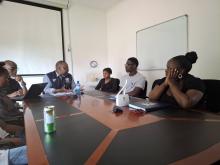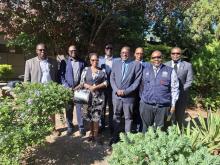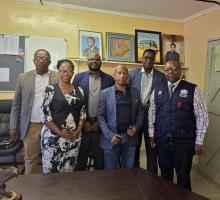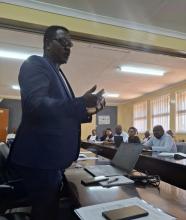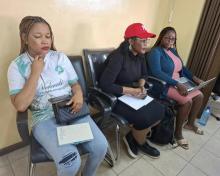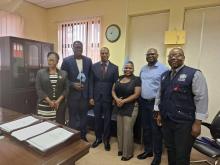Botswana concluded nationwide consultations to shape next HIV/AIDS strategic framework
The Botswana National AIDS & Health Promotion Agency (NAHPA), with support from the World Health Organization (WHO) and other partners, concluded a weeklong series of nationwide consultative forums in February aimed at gathering input for the development of the country’s fourth HIV/AIDS National Strategic Framework (NSF4). These district-level forums were designed to ensure inclusive engagement and collect insights to guide Botswana’s HIV response through 2030.
One of the consultative teams, tasked with covering Greater Gaborone and surrounding districts, began its engagements in Mochudi, Kgatleng District. Addressing participants at the meeting, Deputy District Commissioner Mr. Phenyo Nthaga emphasized that NSF4 aimed to address the gaps identified in NSF3 by adopting a holistic, inclusive approach tailored to Botswana’s unique HIV landscape. He highlighted the importance of engaging local structures such as the District Multi-Sectoral AIDS Committees (DMSACs) and community members to identify challenges and co-create practical, community-driven solutions.
Dr. Tebogo Madidimalo, WHO Botswana’s focal person, stressed the significance of community voices in shaping the new strategy. He noted that findings from the evaluation of NSF3 pointed to the need for a revised philosophical approach and a paradigm shift in NSF4—one that prioritized targeted interventions and more efficient use of resources to improve health outcomes. Participants included representatives from Tebelopele, Stepping Stones International, the Men's Sector, the Ministerial Fraternal, District Health Management Teams (DHMTs), the Botswana University of Maryland Initiative, Bakgatla Bolokang Matshelo, Gender Affairs, law enforcement agencies, and other non-governmental organizations.
Youth sexual and reproductive health (SRH) emerged as a recurring theme during the forums. At a youth dialogue held in partnership with Stepping Stones International, young participants raised concerns about accessibility barriers particularly stigma, lack of privacy, and judgmental attitudes in public health facilities which discouraged adolescents, especially girls, from seeking services such as HIV testing and contraception. “There is an urgent need for youth-friendly services welcoming, private spaces and discreet condom dispensers could make all the difference,” said one participant. Others stressed the inconsistency and age-inappropriateness of current sexual health education curricula, calling for reform and innovative outreach through social media platforms like TikTok, Facebook, and X. Influencers and relatable role models were seen as key messengers to promote safe sex practices, including the combined use of condoms and PrEP.
Cultural barriers were also discussed, particularly traditional parenting styles that discouraged open dialogue about sex and relationships. The forums recommended workshops to help parents communicate more effectively with their children. Peer pressure, early sexual debut, and the normalization of risky behaviors were identified as key issues, underscoring the importance of community-based interventions, peer-led education, and greater parental involvement. In Gamalete, Deputy Paramount Chief Tsimane Mokgosi echoed similar concerns. He emphasized the urgent need for youth-friendly health services in rural areas, where SRH needs were often neglected. He stressed the importance of aligning local initiatives with NSF4 to ensure equitable access to care. Chief Mokgosi also pointed out the continued shortage of condoms and contraceptives, the stigma surrounding sexual health discussions, and the need for stronger collaboration among schools, families, and communities to provide accurate, age-appropriate information.
He advocated for the use of social media to reach young people with information on sexual health and wellness and called for a holistic, community-driven approach to addressing these challenges. Stakeholder consultations in Ramotswa further revealed gaps in the implementation of NSF3. Despite the framework being intended as a national guide, many district stakeholders reported being unaware of its contents, relying instead on local data to guide interventions. This lack of dissemination and understanding of key indicators led to inconsistent implementation and limited alignment with national objectives.
Health service beneficiaries voiced concerns about access to essential services such as PrEP, condoms, STI treatment, and pregnancy prevention. Women, in particular, reported fears of intimidation and discrimination when seeking these services, often from healthcare providers themselves. Many expressed discomforts with male doctors conducting pelvic examinations, and some suggested the need for better privacy at health facilities. There were also calls to improve the packaging and branding of Sekwata condoms to make them more user-friendly and discreet. Intimate partner violence was identified as an escalating but underreported issue. Participants noted the limited engagement of some faith-based groups in HIV prevention efforts, citing knowledge gaps among pastoral leaders as a barrier to full participation in public health advocacy.
Overall, the consultations revealed a clear need for improved coordination, greater awareness of national strategies, and the provision of accessible, confidential, and non-judgmental healthcare services. As the findings from the forums are synthesized into the NSF4 draft expected to be finalized by March 2025, stakeholders emphasized the importance of building a more inclusive and community-responsive framework. The goal remains clear: to enhance service delivery, strengthen public trust, and improve health outcomes for all Batswana, particularly the youth.






